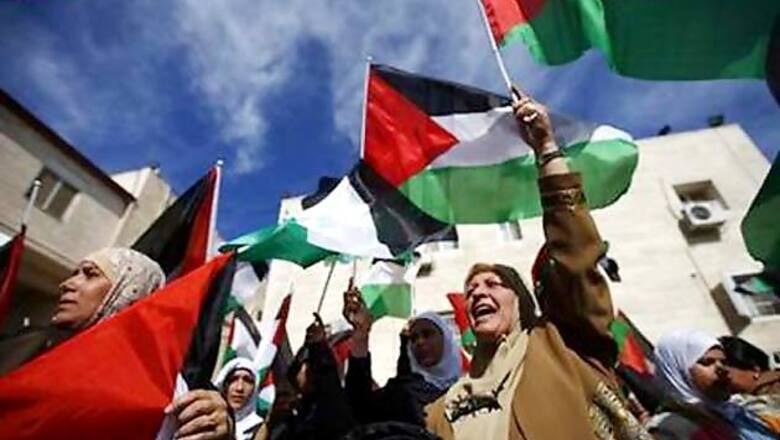
views
Ramallah: President Mahmoud Abbas will confer with key Palestinian leaders on Thursday about a possible resumption of peace negotiations with Israel after an almost three-year freeze, officials said.
They gave no details on what Abbas's terms might be, should he announce a breakthrough after meeting in Jordan with US Secretary of State John Kerry, who has pursued six months of intensive and deliberately discreet diplomacy.
Gaps between the sides had "very significantly" narrowed, Kerry said on Wednesday. His proposals to resume negotiations, which were not spelled out, won the endorsement of an Arab League committee, which said they "provide the ground and a suitable environment to start negotiations".
Abbas, whose peace strategy is routinely censured by the Palestinian Islamist rivals ruling the Gaza Strip, has in the past sought support Arab League support to engage the Jewish state but it was not clear whether Wednesday's endorsement would give him enough political cover to resume direct peace talks.
Abbas was due to convene senior members of the umbrella Palestinian Liberation Organisation (PLO) and his Fatah party at 3 p.m. (1200 GMT) in Ramallah, hub city of the Israeli-occupied West Bank and seat of his U.S.-backed administration.
"We are expecting to hear from the president the ideas presented by Kerry," top PLO member Wasel Abu Yousef told Reuters.
"There will be a discussion on these ideas, and everyone will say what he thinks about this. The conclusion will be by a general consensus."
Negotiations, which have ebbed and flowed for two decades, last broke down in late 2010 over Israel's West Bank settlements and other sticking points. Since then, Abbas at times has insisted that Israel renew and extend a halt on settlement construction for new talks to be held. Israel ruled that out.
Palestinians familiar with Abbas's thinking speculated he might forgo the demand for a construction halt given a recent slowdown in housing starts issued by the Israeli government - though it may still be painful to roll back his previous demand.
If Abbas yields on the issue, it may have been in exchange for a goodwill gesture from Israel - such as amnesty for veteran PLO fighters held in its jails for decades. Israel gave no signs that such prisoner releases were in the offing, let alone any gestures on settlements.
PRECEDENCE
Israeli Prime Minister Benjamin Netanyahu says he is ready to resume peacemaking immediately and "without preconditions" - though his country has long insisted it would keep swathes of West Bank settlements under any eventual peace accord.
Most world powers deem the settlements illegal and the EU announced a plan on Tuesday to bar financial assistance to Israeli organisations operating in the occupied territories.
An Israeli official said Netanyahu "attacked" the plan on Wednesday in conversations with European leaders where he argued that other "burning issues" like the Syrian civil war and disputed Iranian nuclear programme should take precedence.
Netanyahu told Kerry the EU's anti-settlements move "hurt efforts to renew the diplomatic process" with the Palestinians, an Israeli official said. Israel granted initial approval for new homes in Modiin Ilit, a West Bank settlement near Jerusalem and part of the territorial blocs it wants to annex eventually.
Kerry, on his sixth Middle East mission, was upbeat.
"We have been able to narrow these gaps very significantly," he told reporters on Wednesday. "And so we continue to get closer and I continue to remain hopeful that the sides can soon be able to come and sit at the same table."
Kerry held out the prospect of the rewards Israel could reap in a deal leading to the creation of a Palestinian state on land seized in the 1967 Middle East war. Palestine was seen as the springboard for a broader regional peace mooted by the Arab League in 2002 - but which Israel rejected at the time.
The Arab League plan offered full recognition of Israel if it gave up all land it had occupied since 1967 and agreed to a "just solution" for Palestinian refugees.
In a concession to Israel three months ago, Qatar raised the possibility of land swaps in setting future Israeli-Palestinian borders rather than insisting on a return to the 1967 lines. Tzipi Livni, the Israeli cabinet minister responsible for efforts to restart Palestinian talks, at the time called Qatar's move "good news that should be welcomed".



















Comments
0 comment